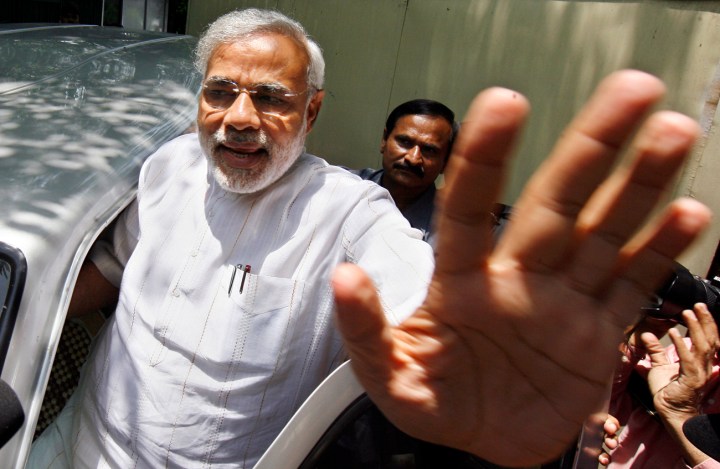It’s been 10 years since the madness that gripped the north-western state of India razed homes, destroyed businesses and stole more than 2,000 lives. These days Gujarat boasts a flourishing economy, yet for those who lost so much this progress has been clouded by an impotent legal system. By KHADIJA PATEL.
On 27 February 2002, the Sabarmati Express, a train that was returning from Ayodhya carrying a number of Hindu activists of the right-wing party, Vishwa Hindu Parishad was stopped in Godhra. It was set alight and 59 people lost their lives that day. In the confusion that followed, it emerged that the train had been set alight by an angry Muslim mob.
In retaliation, deadly riots broke out statewide. More than 150 towns and 993 villages were gripped by terror as marauding gangs swept through. Twenty-six towns were put under curfew in the ensuing days of riots. The scenes of violence were compared to a pogrom – a planned campaign of persecution or extermination sanctioned by a government and directed against an ethnic group.
Eventually the violence would claim more than 2,000 Muslim lives, among them scores of women and children. The official death toll, however, is much lower at 1,169. Some NGOs contend 2,500 people were victims of the riots, pointing out that a number of people were reported missing in the aftermath of the riots. These, they argue, are bodies that were never found. In addition, more than 200,000 people had been displaced. Homes and business were looted, then summarily destroyed.
In explanation, the Chief Minister of Gujarat, Narendra Modi, is famously quoted as saying: “To every action, there is an equal and opposite reaction.” Three months after the riots broke out, Human Rights Watch claimed Gujarat state officials were directly involved in the killings. Their research indicated that what had happened in Gujarat was not a spontaneous uprising. It was a carefully orchestrated attack against Muslims, aided by supporters of Modi’s ruling Bharatiya Janata Party police and state government officials.
Meenakshi Ganguly, South Asia director of Human Rights Watch, explained: “It was clear to us that the police were not taking action to protect Muslim neighbourhoods and preventing the carnage. In certain areas, Muslims sheltering from the mob pleaded for police assistance, but were ignored. The initial investigations by the Gujarat police was slow, and a number of cases were closed.” Among human rights activists, families of the victims and sectors of the Indian media it is established opinion that the Gujarat government under Modi engineered a massive cover-up of the state’s role in the violence. And if the rate of convictions in Gujarat is anything to go by, then the state has indeed succeeded in covering up its role in the violence.
Human Rights Watch found that efforts to investigate and prosecute cases inside Gujarat have repeatedly been stalled and activists and lawyers involved in the cases have been harassed and intimidated. It has taken many interventions by the Supreme Court following appeals by activists and victims’ families to order re-investigations, oversee independent inquiries in some cases, or shift trials out of Gujarat to ensure progress towards justice.
The heaviest sentences have been handed out in cases where Hindus in Godhra were victims of violence. A number of cases have been closed before prosecution could proceed. Others remain open pending further investigations. Christoffe Jaffrelot, wrote in the Economic & Political Weekly that it is the polarising influence of Hindu nationalism that has prevented justice being served. Pointing out that the legal battles of victims of the riots are far from over, he says: “The reasons for this failure of the rule of law lie in the grip that Hindu nationalism – as an ideology and a political movement – holds over the state machinery – including the police and the judiciary – in Gujarat and the central authority’s relative powerlessness, both at the executive and judicial level, to counteract it.
”?Against this backdrop of the perceived impotence of the Indian legal system to mete out justice to the victims of Gujarat riots: “It has taken tremendous courage and patience from human rights groups and above all victim families to make progress,” Ganguly says. She recounts the many legal avenues victims’ families have pursued as they chase tirelessly after justice. “They appealed for Supreme Court intervention to ensure justice. Several cases were handed over to a Special Investigation Team [SIT] and, in those cases, there has been progress. In the case of the attack on the Sabarmati express, and in two cases where there were mob killings, the courts have convicted many of the accused,” she says.
Ganguly points out that some political leaders have also been arrested. Two of the SIT cases have resulted in convictions: a special court in Gujarat in November 2011 sentenced 31 people to life in prison for the killing of 33 Muslims in the village of Sardarpura in Gujarat’s Mehsana district in March 2002. Crucially, of the few legal successes that have been achieved so far, most were not hosted in Gujarat courts. “The Supreme Court also ordered that some 2000 cases be reinvestigated,” Ganguly says. “It also ordered two trials to be shifted out of Gujarat, resulting in convictions. Justice that has been done in Gujarat occurred in spite of the Gujarat authorities, because the courts intervened,” she adds.
On Monday, however, a Gujarat court confirmed that the SIT had found no evidence against Modi or 57 others to charge them with complicity in the Gujarat riots. Zakia Jafri, the wife of former Congress MP Ehsaan Jafri, who was killed in the riots, had alleged that Modi and his co-accused were conspirators in the riots. Jafri alleged that her husband, Ehsan, a former Congress MP, had personally informed Modi on the phone of an impending attack when the mob was closing in. He had sought immediate police protection to control the mob, which she claims Modi could have immediately provided, considering he was the chief minister. It was after Ehsan supposedly spoke to Modi that the mob killed 69 people in the small, middle-class Muslim enclave of Gulberg Society.
For Jafri however, the struggle for justice continues. On Tuesday, a court in the Gujarat capital, Ahmedabad, passed an interim order asking the Supreme Court-appointed SIT to give a copy of its final report and about 20,000 pages of documents to Jafri within 30 days. Siddharth Varadarajan, writing in The Hindu in November 2010, says of Jafri’s quest for justice: “Any society built on the foundations of law would not require the widow of a victim to petition the highest court of the land in order to investigate the reasons behind the state’s failure to protect the life of its citizens during those fateful days.”
Ganguly believes the spread of the Gujarat riots proves there was little political will to stop the slaughter of Muslims. “Most experts agree that a communal riot situation in India can be contained and law and order restored if the authorities have the intention,” she says. “If violence continues for days, with a toll that reaches the thousands, there is complicity – often at the highest levels.” She adds hopefully, “The SIT may not have found enough evidence to seek sanction to prosecute the chief minister, although we still have to see what the report states and also the findings of the amicus.
”Dileep D’Souza, a writer and political analyst in Mumbai, believes that the quest to establish Modi’s culpability is ultimately futile. “It boils down to one person’s word against the other,” he says. “As chief minister, Modi presided over one of the worst breakdowns of law and order in recent Indian history and he should pay politically for that.” D’Souza compares the free reign Modi has enjoyed after the riots to the political repercussion in Mumbai after the terror attacks in November 2009. “The politicians presiding over Mumbai at that time were made to pay with their jobs for the attacks,” D’Souza points out. “Modi has not paid the political price.”
“The fact that the chief minister failed in his moral duty to protect Muslims was stated by his own party leader, then prime minister, Atal Bihari Vajpayee,” Ganguly says. “Even if there is no direct evidence linking chief minister to the carnage, he will be unable to shake off the allegations of complicity, or at least dereliction of duty.”
As Modi now prepares to win another term in office, D’Souza says far too many people are too fond of Modi to further their own nefarious ends. “Modi,” he says, “remains an exceptionally polarising figure in Indian politics.” Ganguly stresses that the wellbeing of India’s minorities rests on the ability of the Indian legal system to mete out justice in Gujarat. “Unless justice is seen to be done, the violence in Gujarat will remain a scar for India’s minorities and for India’s identity as a secular democracy,” she says. DM
Read more:
- India: A Decade on, Gujarat Justice Incomplete at Human Rights Watch.
- What the Gujarat riots verdict means for stakeholders in Daily News & Analysis.
- Big loss for Modi’s online friends on Mid-Day.
- India and Israel: a friendship deepened by prejudice in the Guardian.
Photo: Gujarat’s Chief Minister Narendra Modi gestures to the media after meeting with India’s main opposition Bharatiya Janata Party (BJP) leader and prime ministerial candidate Lal Krishna Advani in New Delhi on 14 May 2009. REUTERS/Adnan Abidi.







 Become an Insider
Become an Insider